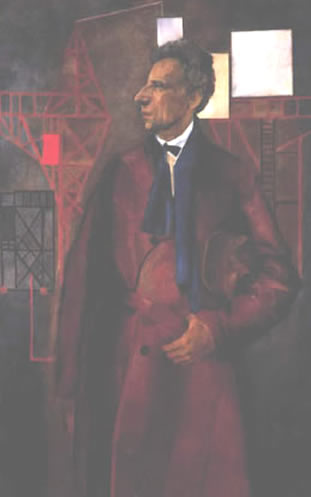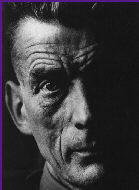
Fundamentals of Stage Direction
Dramatic and Visual Composition
Scene Breakdown [ scene study SS ]
Floor (ground) plan
Featured Pages: Biomechanics DIRECTORS ON DIRECTING by Toby Cole, Macmillan Pub. 0023233001 $64
Service Pages:
Assignments, appendix, books, biblio, dictionary, directory, exercises, links, list, new, outline, contents, popup window, references, tests
Summary
I keep my webpages for my notes, preparing for classes. The pages are in addition to your textbook and my lectures in class.Questions
Film?

The Possessed 2003

Notes
2004-2004 UAF season * * Acting I : BioMethod* Acting III : Method
** Stage Directions : Stagematrix
** Film Directing : Filmmaking for Actors
** Playscript Analysis : Grammar of Drama
2005: in addition to master-teachers (Meyerhold and Stanislavsky) there are several "guest-artists" -- Grotowski, Artaud, Brecht, Beckett.
This course is an orientation to play direction and covers all the basic skills, requirements, and responsibilities of stage directing. Topics and areas explored are: relationships with designers, playwrights, stage-managers, producers, actors, and dramaturgs. The course also explores and puts into practical demonstration; script analysis and interpretation, blocking technique, principles of stage movement and effective stage pictures, directorial concept and realization of the text. Other topics include: auditioning, casting, rehearsal technique and the final rendition of a production.
Dramatic Text: The author's written text - the script - sometimes further defined as that text spoken by actors during a production.
Performance text: "all that is made visible or audible on stage" [Pavis, 1992 Crossroads, 25], and includes the dramatic text, the vocal delivery of that text, physicality, facial expression, the use of mask, light, movement, the use of space, costume and so on.
Famed director Sir Tyrone Guthrie has cautioned that "the only way to learn how to direct a play, is ... to get a group of actors simple enough to allow you to let you direct them, and direct."
If "dramatic text" (play), acting (performance) and mise-en-scene are the means of directing the public, what is Part IV? Genre and Time! Directing chronotope is this special subjective universe, where all (writer, actor, director and spectator) experience drama together...
Another note: director "acts" and actor "directs" -- what a paradox?
Perhaps.
This is why I have such subtitle as "Method Acting for Directors" and "Directing for Actors" -- this is one process as far as spectator is concerned. It is only in the world of profession, we separate what is always together in this amaturish soul of our audience... Spectator, like a child, does not "take apart" his dramatic living, that's why we have "critics" -- what's why spectator resists any analysis, he is by nature is inufying force. After we finished the "cooking" we have to hide the labor, we must keep the kitchen away from the dinning table, we should left them, audience, alone -- to enjoy themselves. We pretend that there is no craft, no recipies, no control and manipulation -- we have to let them feel in control, it's their dream now. They should feel themselves CREATORS, authors, owners of their theatre experience!
I hope that part V (Showcases) could demonstrate this process, when the preparation cycles become invisible, leave public free for one (focused and intense) and one only expirience -- of making stories in their minds and hearts! But is the subject of the other web-project -- The Book of Spectator!
Well, this is the time to leave webpages and get back to real pages (books); the web structure becomes outdated at some point, when you want plain texts (text-only) without the hyper-links and pix... I will try to do it in filmplus.org/d (2005).
Wait!
First, I have to bring together film and theatre directing!
2005 updates: Small Chekhov Fall * "Four Farces & One Funeral" -- Chekhov.05
Chekhov's one-acts are updated -- The Bear, The Proposal (1st act -- Oh, Love!), Wedding, Tobacco (Act II -- Ah, Marriage!), but I'm still working on the "funeral" (Last Day of Anton Chekhov). mini-chekhov
I am teaching DramLit -- groups.yahoo.com/group/dramlit (subscribe) and see THR215 for subjects, topics, titles.
Spring 2006 -- Waiting for Godot, Beckett -- new pages ( see shows )
The Theatre Team: Playwright, Producer, Director, Designers, and Actors. Contributors: Jeane Luere - editor, Sidney Berger - editor. Publisher: Greenwood Press. Place of Publication: Westport, CT. Publication Year: 1998. (quotes)
* Directors on Directing: A Source Book of the Modern Theater by Helen Krich Chinoy, Toby Cole; Bobbs-Merrill, 1963 - 1: The Emergence of the Director
- 2: Vision and Method
- 3: The Director at Work
... Less than a hundred years ago the director was only an ideal projected by disgruntled critics of the chaotic Victorian theater. He did not even have a name, for the terms "director," "rigisseur," and "metteur en scène" had barely begun to acquire their present theatrical meaning. He was imaged as a "disciplinarian" who would superintend the "whole conduct of a piece and exact a rigid but a just decorum." He was conceived as a super stage manager who would be "at one and the same time a poet, an antiquarian and a costumier." When the director did finally appear toward the end of the nineteenth century, he filled so pressing a need that he quickly pre-empted the hegemony that had rested for centuries with playwrights and actors. Working behind the scenes, the director stamped his individuality on a rich and varied international stage. By blending diverse arts into a single organic image he gave form to the complex modern theater, just as the poet had given shape to the Elizabethan stage by words and the actor had crystallized the theatrical idea of the eighteenth century by his personal magnetism. The appearance of the director ushered in a new and original theatrical epoch. His experiments, his failures, and his triumphs set and sustained the stage. ...
The Language(s) of the Show (The Book of Spectator)
Tao:
If you want to become whole,
first let yourself become broken.
If you want to become straight,
first let yourself become twisted.
If you want to become full,
first let yourself become empty.
If you want to become new,
first let yourself become old.
2007 Spring -- class, Fall -- Stoppard ?
... PS? I do not plan to make new pages in this directory, even if I will be teaching directing in Ethiopia [LUL]. No more "formal" courses American-style, apprenticeship. Where this type will be developed online? I do not know. ANT




 I better make a new page, like in film analysis The MASTERS. And "Russian Directors"? Tairov, Vakhtangov and others...
I better make a new page, like in film analysis The MASTERS. And "Russian Directors"? Tairov, Vakhtangov and others...









 -- it must something about me: resume, bio, cv... [ one day I will make it better! ]
-- it must something about me: resume, bio, cv... [ one day I will make it better! ]

